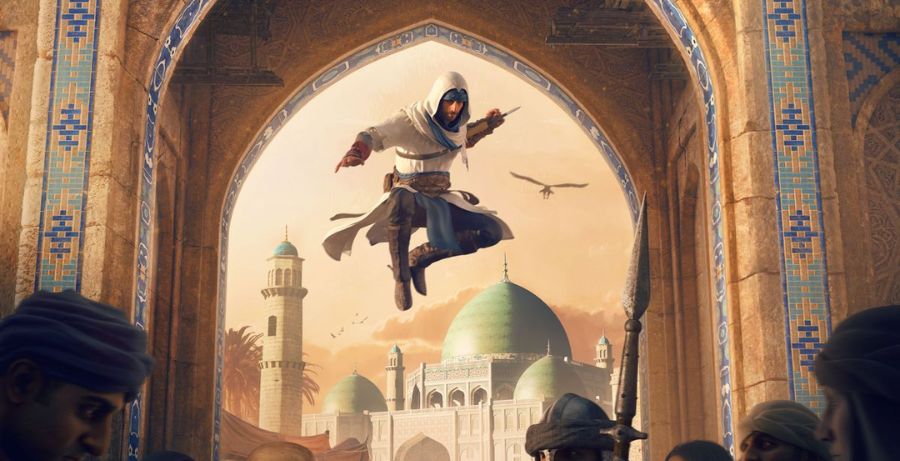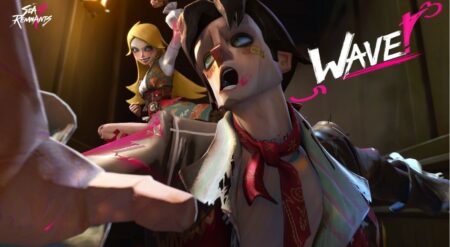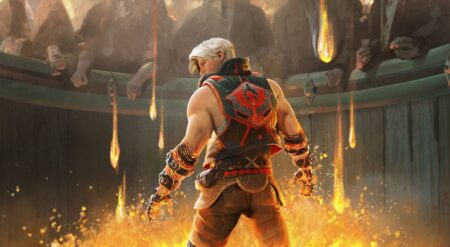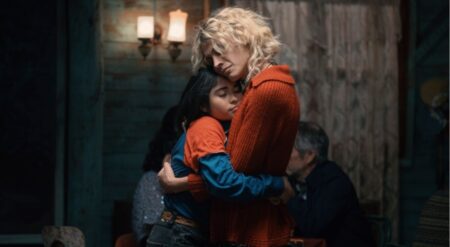Assassin’s Creed Mirage is bringing this iconic video game franchise back to its roots in more ways than one. Perhaps most significantly, by setting this installment in West Asia (the Middle East) once again, like the original Assassin’s Creed, Ubisoft has moved the franchise forward by taking it back to its roots. By giving us another Arab Assassin protagonist (after Altaïr Ibn-La’Ahad) in Basim Ibn Ishaq (Lee Majdoub) in Assassin’s Creed Mirage. By dedicating extensive work to the historical setting of the Abbasid Caliphate in Baghdad, Ubisoft stands to create one of the best instances of Arab and West Asian representation in gaming history, as well as Western media writ-large. Having not played an Assassin’s Creed game since Brotherhood, I was very excited to return to playing the franchise, with this installment reflecting my West Asian background as a Kurd playing Basim.
When we interviewed the game’s star, Lee Majdoub, and the game’s narrative director, Sarah Beaulieu, our conversation explored the creative development of Mirage and the significance of this role for Majdoub. It was clear through our conversation that Majdoub was in a collaborative, supportive, and culturally respectful environment, one that unfortunately remains rare for actors of Southwest Asian or North African (SWANA) backgrounds. The dedication that Beaulieu, her narrative team, and the Ubisoft developers took to make 9th Century Baghdad as culturally meaningful and intriguing for players, for Arab and other SWANA players to feel represented in, and for players outside these cultures to learn about, set Mirage far apart.
Much like his co-star Shohreh Aghdashloo with her character, Lee Majdoub reflected on how Basim ‘s journey in Assassin’s Creed Mirage paralleled his own grapples with his identity. “Basim struggles with identity [in Assassin’s Creed Mirage] and trying to figure out where he fits in and what it is he wants to do with his life, and knowing that he’s meant for something greater,” he says. “And for me, a big part of my life in my early 20s, like late teens, early 20s, I really struggled with being Middle Eastern and shunted it a little bit. I didn’t want to speak the language anymore; there was a lot of prejudice, and it was just easier to kind of shove it aside and pretend I didn’t have that background. And then, for the last few years, a big part of my journey has been falling back in love with my culture and being Lebanese and not shying away from admitting that I am a Middle Eastern.”
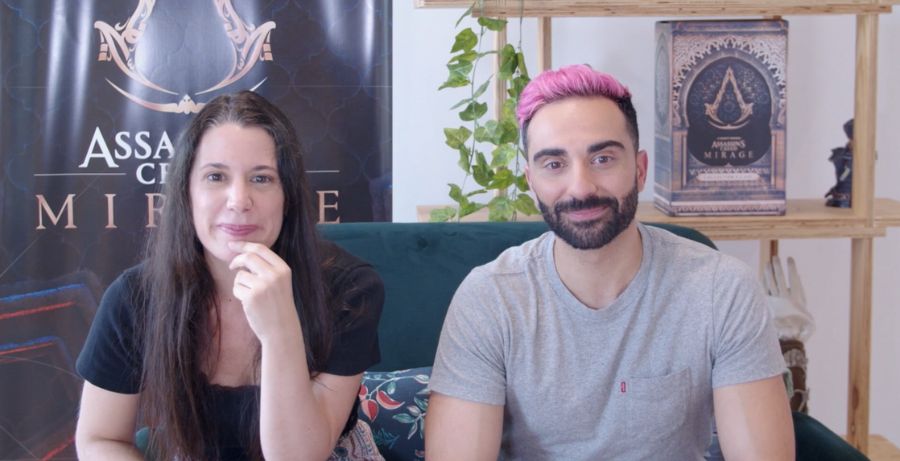
Lee Majdoub recalled how his audition for Mirage coincided in a timely fashion, just as he was relearning Arabic. “About eight months before Mirage, I reached out to my mom, and I was like, ‘Mama I think I want to learn the language again,” he explains. “And so we just three times a week we’d be on the phone. She was teaching me Arabic. She would send me stuff. I was going through the alphabet again, and Duolingo, and she sent me an Arabic education book. She was at home and would take a picture, send it to me on WhatsApp, and be like, “Okay, read this, Tell me what you understand and what you don’t understand.’ And then we were just going through it, and then seven months after starting, Mirage came. One of the big things that the team was asking was you speak Arabic? And I said, ‘Yeah, comfortably now. I can. I’m quite confident in it.”
For Lee Majdoub, Assassin’s Creed: Mirage and Basim provide a major respite to the lack of positive portrayals of SWANA people in mass media and that the gaming experience may be more engrossing for consumers to understand the culture they play in. “To be a person, a person of color, Middle Eastern/SWANA definitely, I think there’s so much more work to be done,” he says. “I still don’t think we have much representation, and for us to be getting representation and video games more than we are in film and TV, it’s something to be said for the video game industry. I think for a while now, video games have been telling deeper stories than a lot of film and TV, as it has been developing deeper characters. And I think one advantage video games have that film and TV don’t is that [they’re] so involved, right? So [players are] kind of experiencing it themselves. And in this one, they get to experience 9th-century Baghdad. The Golden Age of Islam, The positives of what our people were able to bring to the table.”
When asked about the work she and her team put into developing 9th-century Baghdad, Sarah Beaulieu noted that she (and many other schoolchildren in the west) didn’t learn about Islamic civilization growing up. “One of the first things that strikes me is how ashamed that I felt like not knowing anything about it,” she says, “since I didn’t learn anything about it in school. Why don’t I don’t know anything about what life was like there, and we know anything about ancient Greece and ancient Romans? So it became a responsibility for us as a team to to bring back the glory of Baghdad and what it was at that time.”
She adds, “So what I really hope people will get from the game is how glorious the city was and how important it was in terms of history, the culture. The House of Wisdom was a place we don’t know everything about. We don’t even know if it was a building really, but we know that it existed. And how it had lots of scholars there, people translating very important books. If it wasn’t for them, maybe the books wouldn’t have survived, you know? It’s fascinating to see and the Banu Musa brothers in the game. They are crazy inventors who build some crazy stuff and not enough people know about them. We know everything about DaVinci, but we don’t know anything about them.”
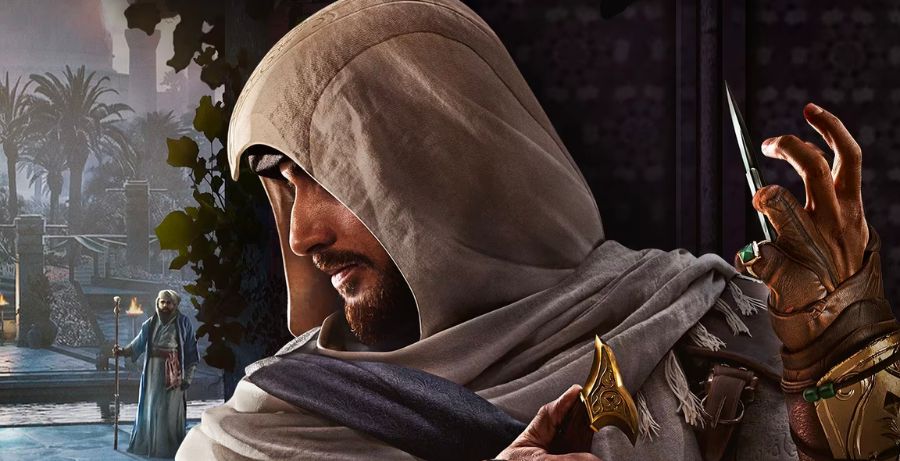
In attempting to make up for her own lack of knowledge about the region during this period, Beaulieu took on the responsibility to learn and spread the knowledge via Assassin’s Creed Mirage and Basim as a protagonist. “That became like a responsibility for the team, and I hope that people will understand how important that city was in what it brought widely to the world itself,” she says. “I mean, it was one of the biggest cities at the time and one of the most important cultural hubs. So yeah, I hope people know what I loved about the city, and what was very interesting to work on as a writer was that it was the multicultural hub…[It had] different ethnicities, different languages, and everybody was mixed in this city. It was fascinating [to learn], and you can feel that in the game. You can hear different languages speaking at the same time, you can see different outfits, and it’s amazing to watch, actually. You can just sit on the bench and watch people hear music, and you can hear people playing music in the streets. And yeah, so I hope that people will feel immersed in what we’re saying like that was at that time, and that’s our reconstruction. That was our responsibility.”
Lee Majdoub jumped off of Beaulieu’s comments, noting how the work she and her team both made him feel represented and inspired to learn more about his culture. ” I felt being a Middle Eastern background, I didn’t know much,” he says. “and I was like, ‘Oh, wow. Okay. I still have a lot to learn about where so many of us come from historically’. And to realize that it was so multicultural. It was like a kind of meeting, an epicenter of like trade and art, exchange and science. And communication and collaboration.”
Sarah Beaulieu elaborated further on her team’s story development and their employment as cultural consultants and writers from the region itself in the process. “So when we started working on the city, we started with the books about the 9th-century series books, and then we slowly brought the historians in so we have at Ubisoft we have our historians,” she says. “Slowly, we called some experts from outside, people who had dedicated their life to Baghdad 9th-century or to the Middle East in general at that time, and we worked with them very closely. So they would feed us with some anecdotes, characters, and everything. That was the first first step I would say.”
Beaulieu further elaborated on how Ubisoft ensured the diversity of Baghdad at the time would be presented. “Very early on we had this team inside Ubisoft who were dedicated to making sure that we don’t make any mistakes in terms of, for example, languages,” she says. “That’s a very big stuff. And checking the accents, making sure that the actors could actually speak Arabic or speak Chinese because we have Chinese characters, as t was the Silk Road. We have people from East Africa, we have people from Turkey, we have Persians. Yeah, a lot of different people.”
The diversity in both the main cast and the NPCs of the game was very intentional, as Ubisoft ensured the voice actors, in both languages spoken and their accents, matched their characters’ backgrounds. “The choice of the accents and the actors’ background brought a lot to the creative process because what we call the master voices in video games are the voices like Lee, who are the first ones to record, so they are the ones we work with, and those are the English speaking people,” Beaulieu says.

“So we have the master voice in the game that is English, and that’s Lee Majdoub and Shohreh Aghdashloo, for example. So we had a choice to make do we take just English-speaking actors, but with no accent at all? Or do we try to make it authentic even though they’re speaking English? And that was a choice that we made with the audio team and the voice designers very early on. We didn’t want fake accents. We wanted to avoid that at all costs. So that’s why the team inside Ubisoft helped us a lot with the casting reviews and making sure that people were good for the job. Making sure to have people that could fit their background.” She continues, “Shohreh Aghdashloo is a good example because her character, when I first wrote her, she was called differently because she was not from Persia, she was Turkic. And the name was not the same because ‘Roshan’ is a Persian name. We changed the name so that it reflected her background more. So yeah, we try to make sure it fits.”
Sarah Beaulieu’s comments visibly heartened Lee Majdoub, who remarked on how this was the most culturally respectful. “For me, I’m not involved in a lot of behind the scenes, he says, “but from everybody I’ve met and knowing what I know, it’s, I don’t think I’ve met someone or heard something about any part of the team that isn’t fully on board 100% and personally committed to the story of Mirage or the design.”
Majdoub motioned behind him, adding, “I mean, even looking behind us at the Mirage logo, it’s so beautiful. The Arabic calligraphy and the design and the theme and the color it’s just so vibrant and so positive, and it’s hard not to feel a little emotional at times. Sometimes I need to take a second take a breath and kind of like really look and be like, ‘Oh, we’ve never had this SWANA or MENA representation.’ It’s never been displayed so unapologetically and so positively. That was something Ubisoft said that they were like 100%. Like you guys said, ‘No, we were not shying away from this. We’re not shying away from the culture. We’re not shying away from the Muslim religion. We’re not shying away from the design.’ This is history.”
Speaking on the character Basim’s journey and how it may branch off of striking revelations about the character already revealed in Assassin’s Creed: Valhalla, Beaulieu remained coy. “So what I can tell you, without spoiling anything, is that you definitely get to see the evolution of Basim, and there is a turning point, definitely. But what is the turning point and at what point is it going to arrive? I’m not gonna say.”

Lee Majdoub reflected on the experience of playing an already-established character in the franchise and how he would aim to focus on the period when Basim was just starting out in Assassin’s Creed Mirage. It was it was definitely cool coming in as an actor, being like, ‘Okay, I’m playing a character that’s already been established. And I know this from following the cinematics myself. I’m a big Assassin’s Creed fan. And I was like, ‘Oh, interesting. How are they going to do this?’ And then we were talking about it…We have the freedom to show the trauma that he goes through, has been through, the internal struggles, the nightmares that he’s having, his struggle with trying to figure out, like, ‘What does life mean? What does my life mean? What am I supposed to do?’ I think that a lot of us can identify with this theme. What do people want from me? What do I have to offer? There’s got to be more to my life than this.”
When asked about why she thought the Assassin’s Creed franchise remained so enduring for so many, Beaulieu focused on the rich details in history and the story it offers to players. “I guess one of the reasons why it’s so I think it’s so compelling is that it’s very rich in terms of lore,” she says. “So I think that when you start diving into Assassin’s Creed and you start to connect the dots between the games and the books, the comics and everything, it’s fascinating how deep the world is and how many stories will told inside it. So as I said, it’s really small, but it’s like a university. It’s really dense, and it’s also actually pretty challenging when you start diving into it, and you want to connect all the dots.”
For Lee Majdoub, the very premise of the game makes it endlessly fascinating. “I’m a gamer. I remember playing the first Assassin’s Creed, and “Oh, I’m in a time period in the Middle East.” The whole idea of, like, having the ability to relive the history of your ancestors through genetic history. Genes can hold onto your people. That idea is so fascinating to me. And then I think what Assassin’s Creed has consistently been able to do, whether you like the gameplay or not, or whether you agree with the story or not, or whatnot is that it so beautifully places you in a historical period that you’ve never been. For me, I found that Odyssey took really long to play, but I just couldn’t help but stop at moments, just looking at ancient Greece in the water and how vibrant it was…[Or Origins] Going to ancient Egypt and being in the sand and looking at the Pyramids and, and being able to climb stuff, and you just don’t get to do that. And then, on top of that, you hit on a story with a character that’s going through trauma and trying to figure something out. You take any historical event or any historical place, and you’ll have an Assassin’s Creed game. I think that’s an amazing blueprint.”
Basim and Assassin’s Creed Mirage stand to do something big for SWANA representation in media, and only time will tell if it hits that goal. But if the Lee Majdoub’s enthusiasm is any indicator, it just may do it.
Assassin’s Creed Mirage is available now on PlayStation 4|5, Xbox Series X|S, Xbox One, and PC.

